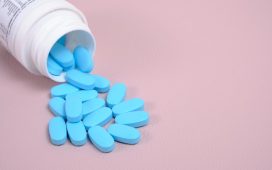But evidence insufficient to assess impact of many treatments to reduce headache frequency in youth
WEDNESDAY, Aug. 14, 2019 (HealthDay News) — Evidence-based therapies are available for the acute symptomatic treatment of migraine in children and adolescents, but evidence is lacking for the impact of many treatments for migraine prevention, according to two updated guidelines published online Aug. 14 in Neurology.
Maryam Oskoui, M.D., from McGill University in Montreal, and colleagues developed evidence-based recommendations for the acute symptomatic treatment of children and adolescents with migraine. The authors note that evidence exists to support the efficacy of use of ibuprofen, acetaminophen, and triptans for migraine pain relief; there was variation in confidence in the evidence between agents. Compared with those receiving placebo, there was high confidence that adolescents receiving oral sumatriptan/naproxen and zolmitriptan nasal spray were more likely to be headache-free at two hours after receipt. For migraine-related nausea or vomiting, no acute treatments were effective.
In a second set of guidelines, Oskoui and colleagues updated recommendations for migraine prevention using pharmacologic treatment with or without cognitive behavioral therapy based on 15 studies. According to the authors, there was insufficient evidence to determine the impact of divalproex, onabotulinumtoxinA, amitriptyline, nimodipine, or flunarizine versus placebo on headache frequency. At least a 50 percent reduction in headache frequency was possibly more likely for children receiving propranolol versus placebo. A decrease in headache frequency was probably more likely for children and adolescents receiving topiramate and cinnarizine versus placebo. A reduction in headache frequency was more likely for children receiving amitriptyline plus cognitive behavioral therapy versus those receiving amitriptyline plus headache education.
“Most medications that are designed to prevent recurrent migraine attacks are only as good as placebo when used in children,” Oskoui said in a statement.
Abstract/Full Text 1 (subscription or payment may be required)
Abstract/Full Text 2 (subscription or payment may be required)
Copyright © 2019 HealthDay. All rights reserved.








